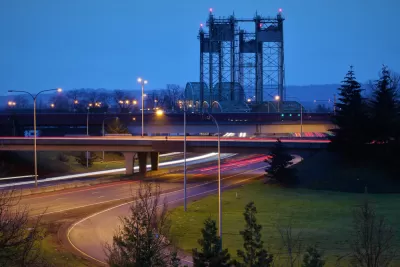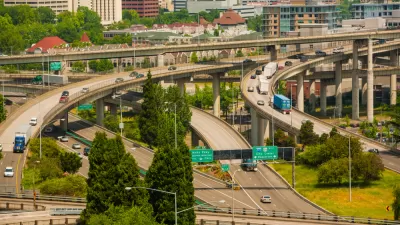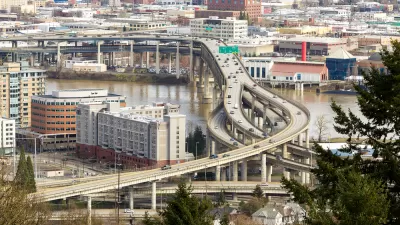The Pacific Northwest's Portland-Vancouver metropolitan area is studying options to add congestion pricing to one or two interstates.

"Oregon's transportation funding bill, House Bill 2017, signed by Gov. Kate Brown (D) last August, does lots more than just add a ten cents-per-gallon gas tax over six years. While the first-of-its-kind bicycle tax garnered lots national attention, a congestion pricing program proposed for the Portland metropolitan area could potentially be far more groundbreaking.
Unlike the $15 bicycle excise tax, which takes effect June 2, congestion pricing of I-205 and/or I-5 could take as long as a decade to implement. However, the Oregon Department of Transportation (ODOT) must submit its recommendation(s) to the Federal Highway Administration (FHWA) by Dec. 31 on which tolling option to pursue.
According to ODOT, "As part of the Keep Oregon Moving legislation (HB 2017), the Oregon Transportation Commission (OTC) established a Portland Region Value Pricing Policy Advisory Committee to guide ODOT throughout the value pricing feasibility analysis." [Value pricing and congestion pricing are essentially synonymous.]
The State Legislature directed the OTC to seek approval from the Federal Highway Administration no later than December 31, 2018. If FHWA approves, the OTC is required to implement value pricing.
At Monday's meeting of the Portland Metro Area Value Pricing Advisory Committee, the WSP, USA Inc. (formerly Parsons Brinckerhoff) consultants unveiled their three recommendations, reports Andrew Theen for The Oregonian on May 14.
Significantly, all three call for tolling the entire roadways, which, if accepted by the OTC, would be a huge change from the current practice of adding one or two express or high occupancy toll lanes in each direction to existing interstates.
Theen describes the three recommendations, in order, that are described in greater detail in the 149-page Portland Metro Area Value Pricing Feasibility Analysis [pdf], prepared by the Portland office of WSP, dated May 7.
- Toll all I-5 lanes between Multnomah Boulevard and Northeast Going Street
- Consider tolling all lanes on I-205 at the Abernethy Bridge
- Toll all lanes of both I-205 and I-5
"Final recommendations will come in late June at the group’s last meeting," adds Theen.
View from the north bank of the Columbia River
"The 25-member advisory committee includes three members from Southwest Washington, including City of Vancouver Mayor Anne McEnerny-Ogle," notes Vancouver's webpage on the Portland Area Value Pricing Feasibility Study.
Columbian staff writer Katy Sword also reported on Monday's meeting of the advisory committee.
“I’m pleased that Concept A was not recommended as it would implement a toll that disproportionately impacts Southwest Washington residents and commuters without providing commensurate benefits,” said Vancouver Mayor Anne McEnerny-Ogle.
Sword notes in her April article that the advisory committee meets next on June 24. "The Oregon Transportation Commission meets July 12 to begin discussing its recommendation."
According to the Community Engagement summary report [pdf] dated May 11, "The OTC will submit a report to the Federal Highway Administration (FHWA) by the end of December 2018."
The timeline for next steps after 2018 depends on direction from the FHWA. Additional work from 2019 onward is likely to include additional public outreach; environmental, traffic and revenue analysis; and the development of an implementation plan.
Adding tolls to all lanes of an existing interstate highway, as opposed to adding toll lanes, is prohibited. States must request waivers from the FHWA. Indiana and Connecticut are pursuing that path.
Hat tip to IBTTA Smart Brief.
FULL STORY: $300 million a year from I-5, I-205 tolls? New details on tolling options

Study: Maui’s Plan to Convert Vacation Rentals to Long-Term Housing Could Cause Nearly $1 Billion Economic Loss
The plan would reduce visitor accommodation by 25,% resulting in 1,900 jobs lost.

North Texas Transit Leaders Tout Benefits of TOD for Growing Region
At a summit focused on transit-oriented development, policymakers discussed how North Texas’ expanded light rail system can serve as a tool for economic growth.

Using Old Oil and Gas Wells for Green Energy Storage
Penn State researchers have found that repurposing abandoned oil and gas wells for geothermal-assisted compressed-air energy storage can boost efficiency, reduce environmental risks, and support clean energy and job transitions.

Private Donations Propel Early Restoration of Palisades Playground
Los Angeles has secured over $1.3 million in private funding to restore the Pacific Palisades playground months ahead of schedule, creating a modern, accessible space that supports community healing after recent wildfires.

From Blight to Benefit: Early Results From California’s Equitable Cleanup Program
The Equitable Community Revitalization Grant (ECRG) program is reshaping brownfield redevelopment by prioritizing projects in low-income and environmental justice communities, emphasizing equity, transparency, and community benefits.

Planting Relief: Tackling Las Vegas Heat One Tree at a Time
Nevada Plants, a Las Vegas-based nonprofit, is combating the city’s extreme urban heat by giving away trees to residents in underserved neighborhoods, promoting shade, sustainability, and community health.
Urban Design for Planners 1: Software Tools
This six-course series explores essential urban design concepts using open source software and equips planners with the tools they need to participate fully in the urban design process.
Planning for Universal Design
Learn the tools for implementing Universal Design in planning regulations.
Ascent Environmental
Borough of Carlisle
Institute for Housing and Urban Development Studies (IHS)
City of Grandview
Harvard GSD Executive Education
Toledo-Lucas County Plan Commissions
Salt Lake City
NYU Wagner Graduate School of Public Service




























